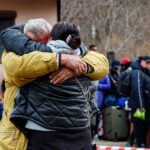Canada is now home to at least 44,615 Syrian refugees. Of these refugees, four out of five
are women and children. There is a clear need for an increase in mental health resources,
resource accessibility, and social connection for Syrian refugees. This paper describes a
Syrian refugee women’s embroidery program that provided both an accessible art therapy
group and a way for the participants to process feelings of hope and loss. Postgroup questionnaires
indicated that the women experienced a sense of pride and mastery over their
completed artwork, built new friendships and community, and felt connected to their homeland
through the embroidery. One-on-one interviews were held to collect the participants’
stories. The participants’ artwork and stories are summarized in this paper, and the stories
are available in full as supplementary material.
Using culturally appropriate, trauma-informed support to promote bicultural self-efficacy among resettled refugees: A conceptual model
Resettled refugees face pressure to integrate successfully into the culture of their resettlement country within a relatively short period of time. Though successful integration is important, research has shown that ethnic identity and participation in the ethnic culture of origin play a key role in supporting the mental health of resettled refugees. This paper presents…

